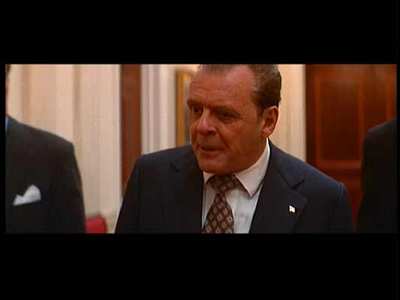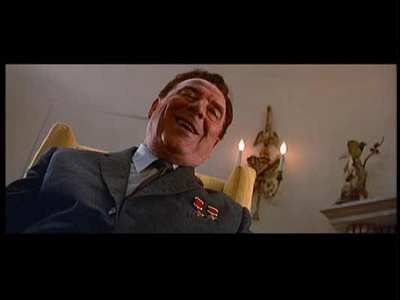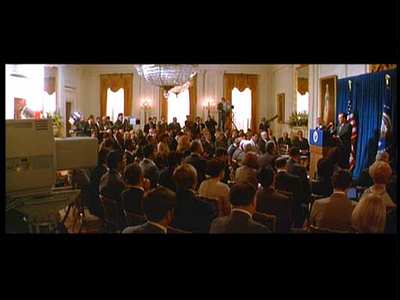Review of Nixon
Introduction
Oliver Stone never makes things easy: take one of the least sympathetic men in recent memory, give him his own flashy, big budget biopic (not exactly the most profitable genre in the universe); merge it with a densely constructed narrative of flashbacks and flashbacks within flashbacks, riddle it with dozens of characters, a seemingly endless variety of camera stock and a three-hour plus running time… Lets just say the results didn’t exactly slay the box office, which is a pity, because this labyrinthine study of Richard Nixon is a dazzling piece of political theatre with a truly stunning cast: Joan Allen, Paul Sorvino, Bob Hoskins, James Woods, J.T. Walsh, Ed Harris, E.G. Marshall, Powers Boothe, Mary Steenburgen, David Hyde Pierce. Oh, and that Hopkins guy is in it too.

Video
The gorgeous ‘Scope photography gets a good transfer on this disc, but why oh why isn’t it anamorphic? (Grumble, grumble.)

Audio
A disappointing stereo track which, while having no specific faults, is in place of a 5.1 surround track that should really be here instead. Particularly in a film with as rich a sound design as this.

Features
An incredibly short (but not totally uninteresting) featurette who’s existence becomes merely frustrating at the lack of any deeper examination. The re-released Region 1 edition (available in the quite amazing ‘Oliver Stone Collection’) includes deleted scenes, commentary, making of and other features. This one doesn’t even have scene selections. If you’re a fan, you might want to think about investing in the big one.

Conclusion
Although it partakes in a similarly exhausting level of information overload that made a massive hit of ‘JFK’, ‘Nixon’ is a wholly different kettle of fish: an ‘inner’ American panorama that is part sociopolitical dissection of corruption at the highest level, and part psychological landscape of the blinding allure of power and the bitter undertow of the impenetrable past. Stone takes one of the most demonized political figures in American history and constructs a dizzying cocktail of Eisensteinian political dialectic and brooding Greek tragedy.
The whole endeavor of course hinges on Hopkins mesmerizing performance. He plays Nixon as an infantilized paranoiac, attacked on all sides by invisible foes. A self-pitying nervous wreck who nurtures the demons of his past, unwilling and unable to resolve them. Nixon cowers and boasts before his anonymous ‘silent majority’ and a mysterious scraggle of right-wing power-mongers who sing his praises as everyone seems to deride him. He is surrounded by demons silent and invisible that eventually render him mumbling and ancient, obsessively guarding his incriminating Watergate tapes. The film’s narrative revolves around a single ‘long, dark night of the soul’ as Nixon confronts his past, his failures and his inner turmoil. Joan Allen shines too, as Nixon’s beleaguered wife Pat, as does Paul Sorvino as Kissinger, although Stone’s representation of him as Nixon’s pious best friend is rather hard to swallow.
For once the cataclysmic content, with its truly epic sweep, suits Stone’s sledgehammer approach, which is balanced with moments of surprising tenderness and poignancy. If the conclusion is as monolithically somber and elegiac as one would predict, it’s not without a deeper resonance: Nixon’s self-destructive collapse is not merely his own neurotic undoing, but the nation at large, locked in a concussive cycle of denial, slowly coming to pieces from within. Its historical faithfulness can (and will) be debated ad nauseam, but as a grandiose exercise in sympathy for the Devil, it’s hard to beat.
Your Opinions and Comments
Be the first to post a comment!